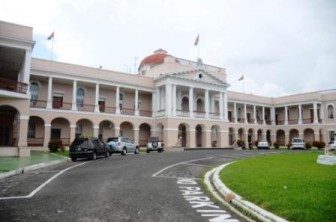The Guyana Human Rights Association today said that the PPP/C appears to be in denial over the results of the November 28, 2011 elections results as evidenced by its posture on the recent opposition-led budget cuts in parliament and the group stated that the ruling party should see setbacks as wake-up calls to engage more constructively.
In a statement on “critical issues”, the human rights body said that the recent budget exercise was the first expression in Parliament of the division of power as a result of the general elections.
 “Without reference to specifics, the fact that a ruling party was unable to rubber stamp its budget through the Parliament for the first time since 1968 is in itself a welcome sign of democratic evolution. Unfortunately, the present ruling party, rather than take credit for democratic progress, appears to remain in denial of the November election results. Excessive language describing the opposition as ‘dictatorial’; pressuring public sector workers to demonstrate in front of Parliament; holding candle-light vigils at the state-owned NCN TV station; using state media to sustain distorted panel discussions; and the on-going disinformation campaign in interior areas, all indicate resistance to political negotiation as created by the recent elections”, the GHRA said.
“Without reference to specifics, the fact that a ruling party was unable to rubber stamp its budget through the Parliament for the first time since 1968 is in itself a welcome sign of democratic evolution. Unfortunately, the present ruling party, rather than take credit for democratic progress, appears to remain in denial of the November election results. Excessive language describing the opposition as ‘dictatorial’; pressuring public sector workers to demonstrate in front of Parliament; holding candle-light vigils at the state-owned NCN TV station; using state media to sustain distorted panel discussions; and the on-going disinformation campaign in interior areas, all indicate resistance to political negotiation as created by the recent elections”, the GHRA said.
It also criticized the main opposition group APNU for attempting to strike deals earlier this year at the Office of the President. GHRA said that the APNU move was disconcerting to citizens and that even informal meetings on the budget should take place in Parliament and not at OP. APNU has since included the AFC in its engagements with Office of the President.
“The willingness of the major opposition party to discuss a budget deal at the Office of the President in the middle of the Parliamentary debate is disconcerting to citizens trying to follow our rickety political process. Resolving national budgetary issues by party leaders in this manner is only possible because in our system MPs are not accountable to constituencies. Even informal budget meetings should take place in Parliament, not the OP or the courts or party headquarters. The fact that this particular meeting appears to have ultimately created distrust on all sides of the political spectrum may turn out to be not a bad thing in the long run”, the GHRA stated.
It said that the opposition led budget cuts and the recent ruling by the Chief Justice against the PPP/C over the composition of the parliamentary committee of selection have led to speculation about the possibility of a snap election being called by the government. The human rights body said that the more positive response would be for the ruling party to treat both developments as wake-up calls and to engage more constructively in Parliament.
It argued that a snap election would be a signal to revert to the ethnic dictatorships that prevailed from the 1960s.
“…a snap election would reflect a desire to return to the ethnic dictatorships which characterized Guyanese politics since the 1960s. Moreover, since the ruling party has to date offered little to either its own supporters or other citizens, particularly the young, with respect to jobs, education or a more attractive future, any snap election could only be won by appealing to ethnic loyalties”, GHRA said.

